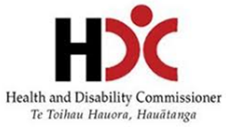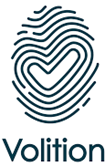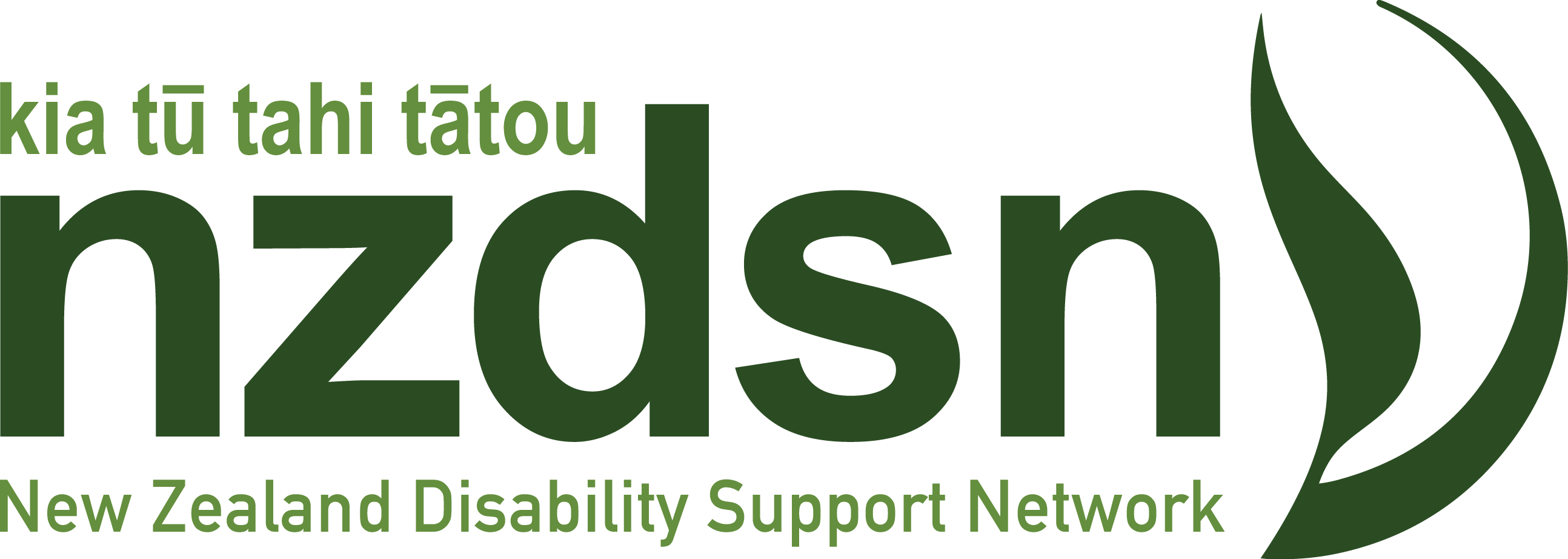20 Minute Presentations

1.3 Innovation Fund
MSD
The Innovation Fund is to support the establishment and development of systems, practices, processes, and reporting that will deliver better experiences and outcomes for those receiving Community Participation services.

1.4 Transition to Service
The Chris Ruth Centre Trust
New persons transitioning into a service should be a positive experience for all parties. It is the opportunity for building rapport and relationships to ensure persons receive the outcomes they deserve to live the best life they can

1.5 Quality Improvement, the Code and the Review
Health and Disability Commissioner
This brief presentation focuses on our work, quality improvement and the Act and Code Review we are currently undertaking, which has a particular focus on how the Act and Code work for disabled people.

2.9 Changing legislation for housing and achieving a higher standard of accessibility in the built environment regardless of outdated legislation
CCS Disability Action
The built environment is governed by the Building Act that does not reflect universal design and provides poor outcomes for accessibility. Commercial and Public buildings and spaces are required to meet specifications developed over 20 years ago and the housing market has no relevant legislation relating to accessibility.

1.11 Mapping New Zealand’s Most Accessible City
Access Maps
Skillet is a technology-for-accessibility company that strives to make it easy for Kiwis with access needs and their whānau to engage with the world on their own time and terms. Our Access Maps make it easy for our community members to find accessible venues (e.g., libraries, retail shops, etc.), amenities (e.g., accessible parking, gender-neutral restrooms, etc.), and events (e.g., inclusive sports, quiz nights, etc.). With our strengths-based approach to accessibility, we make it easy for councils, non-profits, and businesses to show their continued commitment to accessibility and inclusion.

1.12 Understanding and responding to the knowledge and support needs of people managing a flexible funding budget on behalf of someone with a learning disability.
Open Polytechnic / Good Lives Wairarapa
This is a report of the preliminary findings of a Canterbury University Master’s thesis that looked at the strategies family-carers used to provide a good life for a person they support by use of a flexible budget. This study focused on enabling factors that support the complex task of using a flexible budget to provide a good life for a family member with a learning disability.
![]()
1.13 Expansion of Auckland Disability Law’s Community Education Sessions Nationwide
Auckland Disability Law
There are three key branches to Auckland Disability Law’s work: legal advice for Deaf and disabled clients, community education sessions on the legal issues Deaf and disabled people encounter, and law reform work. Although our name is Auckland Disability Law, we do work with clients from around the country. However, in the past we have only been able to deliver our community education sessions in the Auckland and Northland regions. We wanted to expand our services so that Deaf and disabled people across Aotearoa could access free education about their legal rights.
![]()
2.5 More than just disability (TBC)
NorthAble Matapuna Hauora
We work across a geographically and socially diverse area. Te Tai Tokerau has (relative to other regions): high levels of deprivation; high proportion of the population identify as Māori; and high proportion of population live with a disability; significant growth in the over 65 age group over the next 20 years. Many of our people live rurally and are frequently isolated with limited access to services. As a result, NorthAble is delivering services for people who have difficult, complex lives as a baseline, which can be just further complicated by engaging with an often complex and confusing disability sector.

2.11 Moving forward with Volition; the tool for Supported Decision Making you always knew you needed.
Volition
Volition is a smart and simple app to empower disabled people as the decision makers in their own lives. It is a digital preference bank that is owned and controlled by the disabled person – the Decision Maker. It is built to be accessible so it can be used by the disabled person independently, in collaboration with their supporters, or in a wholly facilitated manner by supporters on behalf of the decision maker.

1.6 ‘What device?’
Spectrum Care
Communication Devices e.g. iPads with an app like TouchChat are a common support for people with communication needs. Alongside this, device abandonment is a common issue.

1.7 Making a positive difference to people’s lives through aret and community in upper Coromandel
Coromandel Independent Living Trust: Te Mana Tanbgata and Artists in the Making
In a rural remote community, we work with people with a range of barriers to participation. We welcome them all into one space. We create a safe and welcoming space focussed on creativity, individual goals and community participation.
60-Minute Presentations
![]()
1.1 Preventing and Countering Violent Extremist Grooming. Supporting providers to overcome a new threat to disabled people in Aotearoa
Explore Hapainga Ora
Internationally, there are thousands of “online pods’ established by radical extremist groups who are using fake profiles and online forums to befriend and eventually groom vulnerable adults. The New Zealand Security Intelligence Service has contracted Explore to work with Whānau, Family Carers, IF hosts and Disability Providers to develop resources and tools to help prevent and counter this threat.
![]()
2.4 Legal Orders & Rights
Spectrum Foundation Group
People with disabilities in services not getting their health and welfare needs met due to mental incapacity & no natural networks to support guardianship/decision making.
In addition, a lack of understanding by staff, people, bureaucrats and family/whanau on legal Orders and a legally appointee’s role. Understanding that the person has a right to take risks, but the provider has a duty of care.

2.8 IF Budgets – Control and Choice
Allies Aotearoa
As a parent who has worked for many years within the sector, Tony has deep experience on both sides of the ‘fence’. This has also provided insights in the challenges faced by many families in respect to their relationship with providers and the sector at large.

1.8 From Data to Dignity: Health and Wellbeing Indicators for New Zealanders with intellectual disability
IHC
Despite being a population with poor outcomes, there is relatively little reliable and up-to-date data on the experiences of intellectually disabled New Zealanders.
![]()
1.9 Our story of enabling good lives to enable good lives – the social impact evidence of an ecosystem approach
SkillWise (in collaboration with Humanly & Huber Social)
How do we understand what really matters? How do we know if we’re enabling good lives? And how are our good lives interconnected? In a current context of funding and workforce challenges, we need to understand the impact of the work we are doing to enhance wellbeing through person-directed service, for those who are being served (persons and family| whānau|aiga) and those who are being of service (disability workforce).
![]()
1.10 What’s next? Transition from school into work for those with disabilities.
Taimahi Trust
Lack of transition from school into work opportunities for school leavers with learning/ intellectual disabilities in Northland. We have developed small businesses to work as training platforms providing real life work opportunities. Our produce shop provides an opportunity in retailing and liaising with the public. Our commercial kitchen provides hospitality experience, and our hot house provides horticultural learning.

2.15 Overcoming the barriers to employment for people with a disability
Disability Resource Centre (Hawke’s Bay Trust)
We belief in the value and dignity of every person, whether they have a disability or not, cannot be passive – it requires action. Increasing the role of employment as a pathway out of poverty for people with disabilities will not only be beneficial to those people but will also be beneficial for the employers that hire them as well as our wider society.

2.17 Equitable Access to Wellbeing: Improving services for individuals with a learning disability and autistic people experiencing mental distress and addiction.
Te Pou
Individuals with a learning disability and autistic people are more likely to experience mental health challenges and to be more significantly impacted by those challenges. However, these same individuals are less likely to have a formal diagnosis or be supported by mental health services, leaving the disability workforce to support people through challenging circumstances.
Te Pou has developed the Equitable Access to Wellbeing framework to help build a shared understanding of what this experience is like for people and how our workforce and services can best respond.
![]()
2.6 My Business Starter – Empowering disabled people to thrive in business
Disability Business Network and CCS Disability Action
My Business Starter is a purpose-built programme for disabled people run by the Disability Business Network on behalf of CCS Disability Action. It is designed to give disabled people interested in self-employment the knowledge, tools and skills to create their own business. The My Business Starter programme is run by three leaders in the disability sector who have a proven track record in helping disabled people thrive. Selwyn Cook, Sandra Budd and ‘that blind woman’, Julie Woods. They also head the Disability Business Network.
